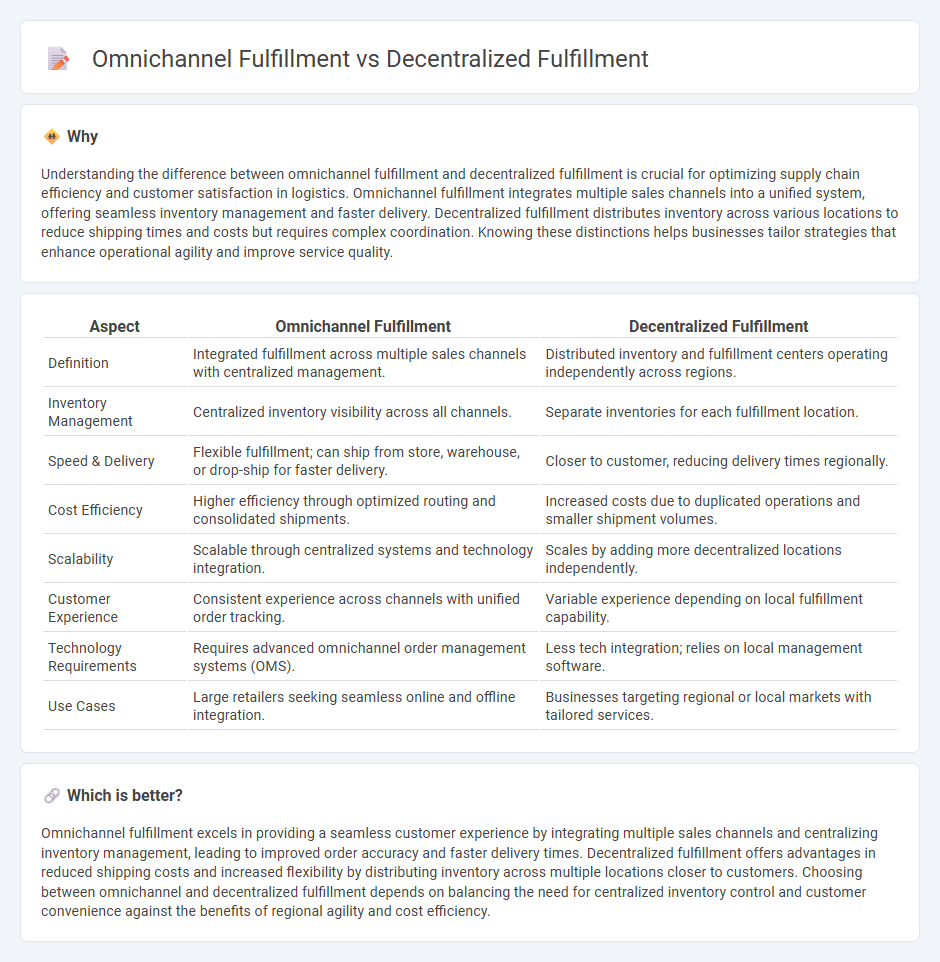
Omnichannel fulfillment integrates multiple sales channels into a single, cohesive distribution strategy, optimizing inventory management and enhancing customer experience by offering seamless order processing across online and offline platforms. Decentralized fulfillment distributes inventory across multiple regional warehouses or stores, reducing delivery times and transportation costs while increasing flexibility to meet local demand. Explore how leveraging the strengths of omnichannel and decentralized fulfillment can revolutionize your supply chain efficiency.
Why it is important
Understanding the difference between omnichannel fulfillment and decentralized fulfillment is crucial for optimizing supply chain efficiency and customer satisfaction in logistics. Omnichannel fulfillment integrates multiple sales channels into a unified system, offering seamless inventory management and faster delivery. Decentralized fulfillment distributes inventory across various locations to reduce shipping times and costs but requires complex coordination. Knowing these distinctions helps businesses tailor strategies that enhance operational agility and improve service quality.
Comparison Table
| Aspect | Omnichannel Fulfillment | Decentralized Fulfillment |
|---|---|---|
| Definition | Integrated fulfillment across multiple sales channels with centralized management. | Distributed inventory and fulfillment centers operating independently across regions. |
| Inventory Management | Centralized inventory visibility across all channels. | Separate inventories for each fulfillment location. |
| Speed & Delivery | Flexible fulfillment; can ship from store, warehouse, or drop-ship for faster delivery. | Closer to customer, reducing delivery times regionally. |
| Cost Efficiency | Higher efficiency through optimized routing and consolidated shipments. | Increased costs due to duplicated operations and smaller shipment volumes. |
| Scalability | Scalable through centralized systems and technology integration. | Scales by adding more decentralized locations independently. |
| Customer Experience | Consistent experience across channels with unified order tracking. | Variable experience depending on local fulfillment capability. |
| Technology Requirements | Requires advanced omnichannel order management systems (OMS). | Less tech integration; relies on local management software. |
| Use Cases | Large retailers seeking seamless online and offline integration. | Businesses targeting regional or local markets with tailored services. |
Which is better?
Omnichannel fulfillment excels in providing a seamless customer experience by integrating multiple sales channels and centralizing inventory management, leading to improved order accuracy and faster delivery times. Decentralized fulfillment offers advantages in reduced shipping costs and increased flexibility by distributing inventory across multiple locations closer to customers. Choosing between omnichannel and decentralized fulfillment depends on balancing the need for centralized inventory control and customer convenience against the benefits of regional agility and cost efficiency.
Connection
Omnichannel fulfillment relies on decentralized fulfillment centers to efficiently manage inventory across multiple sales channels, reducing delivery times and enhancing customer satisfaction. Decentralized fulfillment enables businesses to strategically position stock closer to end consumers, supporting seamless order processing whether customers shop online, in-store, or through mobile apps. This integration optimizes supply chain agility and inventory visibility, essential for meeting diverse customer expectations in an omnichannel retail environment.
Key Terms
**Decentralized Fulfillment:**
Decentralized fulfillment distributes inventory across multiple regional warehouses, enabling faster delivery and reduced shipping costs compared to centralized systems. This approach improves order accuracy, minimizes last-mile delivery challenges, and enhances customer satisfaction through localized inventory management. Explore how decentralized fulfillment can streamline your supply chain and boost operational efficiency.
Micro-fulfillment Centers
Micro-fulfillment centers enable decentralized fulfillment by placing small, automated warehouses closer to urban consumers, reducing delivery times and last-mile logistics costs compared to traditional omnichannel fulfillment strategies. These centers optimize inventory distribution across multiple local hubs, enhancing flexibility and responsiveness to fluctuating demand patterns in various channels such as in-store pickup, delivery, and e-commerce. Explore how integrating micro-fulfillment centers can revolutionize your supply chain efficiency and customer satisfaction.
Inventory Segmentation
Decentralized fulfillment involves storing inventory across multiple, distributed locations to enable faster, localized order processing and reduce shipping times, while omnichannel fulfillment integrates inventory across all sales channels, providing a unified stock view to optimize product availability and customer experience. Inventory segmentation in decentralized fulfillment allows retailers to allocate specific products to individual warehouses based on regional demand patterns, minimizing stockouts and overstock risks. Explore how strategic inventory segmentation can enhance efficiency and customer satisfaction in both decentralized and omnichannel fulfillment models.
Source and External Links
Decentralized Fulfillment is Becoming the Ecommerce Gold Standard - Decentralized fulfillment involves distributing order processing across multiple locations to speed delivery and reduce shipping costs, contrasting with centralized fulfillment based in a single warehouse or facility.
Centralized vs. Decentralized Logistics: Which One is Right For Your ... - A decentralized logistics model uses multiple local fulfillment centers or store locations to fulfill orders, enhancing flexibility, reducing costs, improving customer satisfaction, and enabling faster delivery through strategic distribution networks.
Why E-commerce businesses are shifting to decentralized warehousing - Decentralized warehousing stores inventory in multiple smaller warehouses near customer bases to enable faster order fulfillment, scalable operations, market expansion, and improved supplier relationships.
 dowidth.com
dowidth.com